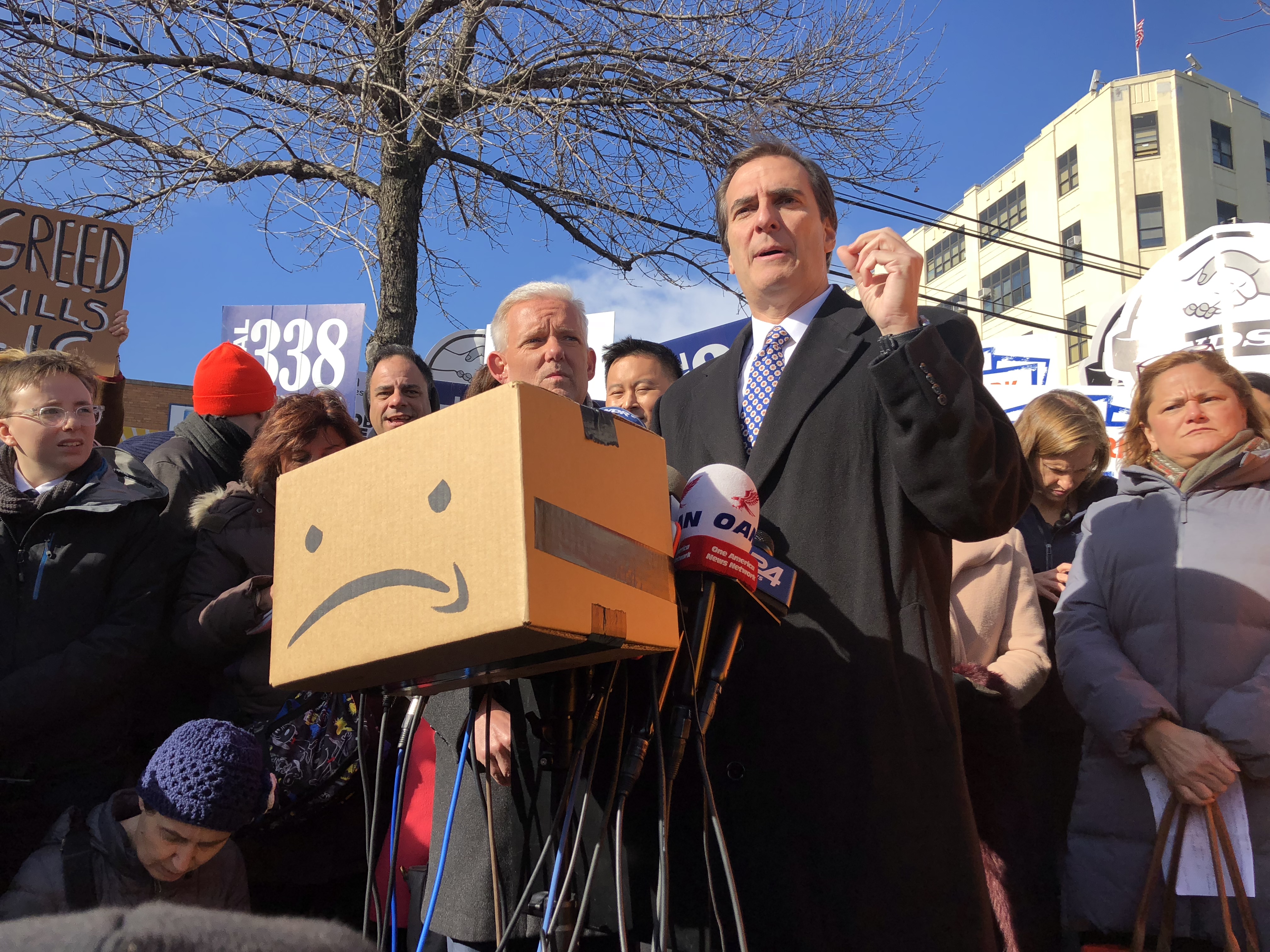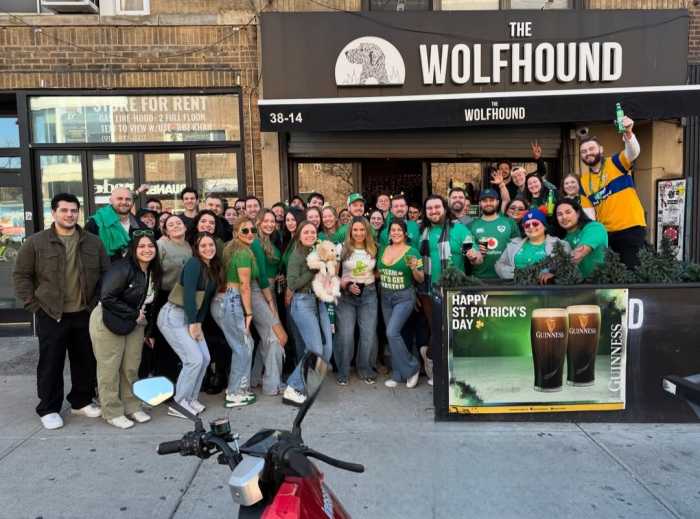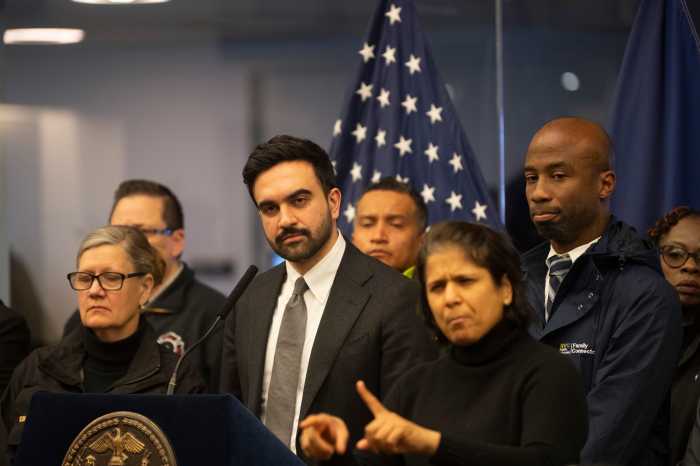Prop boxes at the “Say No to Amazon” rally on Nov. 14, one day after the company officially selected Long Island City for its campus. (Photo: Nathaly Pesantez)
Feb. 25, 2019 By Nathaly Pesantez
The stunning collapse over a week ago of Amazon’s plans to build a Long Island City campus continues to draw reactions from far and wide, with the state’s budget director recently publishing a scathing open letter that claims labor unions and local politicians are at fault for the loss of “the single greatest economic development opportunity we have had.”
Robert Mujica, who has served as the state’s budget director since 2015, released the lengthy letter on Friday afternoon lamenting the “tremendous loss for New Yorkers” in Amazon’s reversal, and singled out the Retail, Wholesale and Department Store Union, State Sen. Mike Gianaris and Council Member Jimmy Van Bramer among “several factors” that led to the deal’s demise.
In the letter, Mujica even accuses the RWDSU—among the most vocal groups in pushing for Amazon’s workforce of 25,000 at the now-scrapped Anable Basin campus to be unionized—of deploying and paying several community based organizations to oppose the Amazon deal as a negotiation tactic.
“Ironically, much of the visible ‘local’ opposition, which was happy to appear at press conferences and protest at City Council hearings during work hours, were actual organizers paid by one union: RWDSU,” Mujica wrote, adding, “If you are wondering if that is even legal, probably not.”
Mujica’s claim, which comes on the same day Governor Cuomo called the failed Amazon deal “the greatest tragedy I have seen since I’ve been in politics,” was even backed by Cuomo’s office.
BREAKING! BANNER DROP AGAINST @Amazon #HQ2Scam #AmazonAnswersNYC at City Council Chambers! pic.twitter.com/M7vpr2vMG7
— QNU (@QueensBarrios) January 30, 2019
“Of course RWDSU funds these groups—and with their paid protestors, they cost their union brothers and sisters in the trades…11,000 union jobs,” reads a statement from a governor spokesperson sent to NY1. The lost jobs are in reference to the construction and building maintenance positions that were negotiated as part of the deal.
RWDSU, in response, rejected Mujica’s premise that the union had employed community groups to protest, and called his letter “deceitful and dishonest.”
“These groups have always stood for our shared principles,” the labor union said, according to reports. “Not everything is transactional.”
The union said the letter attempts to justify a failed process “shrouded in secrecy and…crafted without the input of the countless people who would be directly affected.”
Make the Road New York, one of the groups that organized heavily against the HQ2 deal, also released its own response to Mujica’s accusation.
“In true Trumpian fashion, Andrew Cuomo thinks he can bully his way out of the embarrassment of having New Yorkers forcefully reject his terrible Amazon deal,” said Deborah Axt, co-executive director of the nonprofit.
Mujica’s Feb. 22 letter also calls out Gianaris and Van Bramer for rejecting the deal after initially signing letters urging for Amazon to select Queens for the buildout. The change, Mujica said, was a result of the two politicians trying to cater to “minor, but vocal local political forces.”
“Both Gianaris and Van Bramer flip-flopped on this position after Long Island City was chosen, distorting the facts of the agreement and mischaracterizing the tac subsidies as ‘a cash giveaway’,” he said. “Now that Amazon has pulled out, local politicians are feeling the backlash from the project’s previously silent supporters and are dissembling.”

State Senator Michael Gianaris at the “No to Amazon” rally on Nov. 14. (Photo: Nathaly Pesantez)
He added that opposing Amazon “was not even good politics,” and that the politicians against the deal “are like the dog that caught the car.”
On the day of the deal’s demise, several politicians, including Van Bramer and Gianaris, all but referred to the news “a victory,” but said Amazon’s choice to leave proved the company “wouldn’t be a good neighbor” and that it opted to go rather than adapt.
Mujica also addressed Gianaris’ appointment to the Public Authorities Control Board, a state body that would review part of the Amazon deal, but could stop the entire project. Gianaris’ appointment, while not confirmed by Cuomo and ultimately dropped by the Senate, raised the stakes in the Amazon chronicles given the veto power each member has.
“Amazon assumed that the hostile appointment doomed the project,” he wrote.
While the majority of budget director’s letter criticizes local politicians and activist groups, Mujica does suggest that the city and state “could have done more to communicate the facts of the project and more aggressively correct the distortions.”
“We assumed the benefits to be evident: 25,000 to 40,000 jobs located in a part of Queens that has not seen any significant commercial development in decades and a giant step forward in the sector, further diversifying our economy away from Wall Street and real estate,” he wrote.
Among the details of the deal that became major points of contention include the nearly $3 billion in performance based subsidies that Amazon would receive if it created the thousands of jobs as planned on its campus. Many politicians treated the subsidy as existing funds that could have been better spent on housing or transportation.
“This is either a blatant untruth or fundamental ignorance of basic math by a group of elected officials,” Mujica wrote.
The letter ends on a note that the state lost $27 billion in revenue, up to 40,000 jobs “and a blow to our reputation of being ‘open for business’.”
“The local politicians that catered to the hyper-political opposition hurt their own government colleagues and the economic interest of every constituent in their district,” Mujica wrote. “The true local residents who actually supported the project and its benefits for their community are badly hurt. Nothing was gained and much was lost. This should never happen again.”
Since Amazon’s Feb. 14 announcement that it would no longer pursue plans for a New York campus, grassroots organizers, politicians and other activists against the project have rejoiced and vowed to continue efforts, while those in favor of the plan—ranging from real estate insiders, local businesses and officials—have either lambasted the same actors or blamed Amazon alone for the lost deal.
Amazon’s departure also means the private and publicly-owned waterfront lots slated for the project are now back on the table. The city had plans to build what it called the Long Island City Innovation Center at the lots, while Plaxall, the plastics manufacturing company, had outlined a massive development at several of its sites that could reach 5,000 apartments over the course of 15 years.
James Patchett, the CEO of the Economic Development Corporation, all but indicated that the parcels would see the prior project on site during an event last week, but did not specify if the same plan was in store. The EDC did not respond to questions about development on the lots.


































